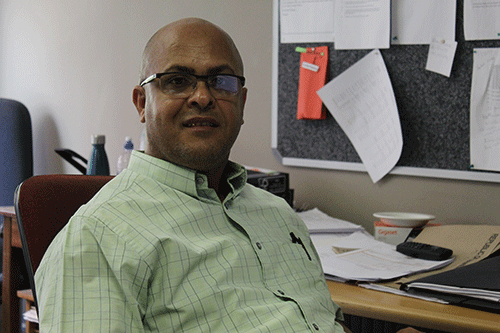“When I retire, I want to look back and be proud of myself and what I have accomplished. I want to have a lot of stories to share, I want to leave a customer service legacy.”
This is what Peter Du Toit, a chief development planner at the Ministry of Agriculture, Water and Land Reform had to say– and from the looks of it, that is the principle that he lives by.
Born and bred in Khomasdal, Du Toit is a long-serving government employee at the ministry of agriculture, with a record of 24 years.
He joined the public service in 1998, as a clerk at the then Ministry of Land, Resettlement and Rehabilitation and was later promoted to the position of a chief clerk. He worked his way up the ladder and was promoted to development planner and eventually to chief development planner in the Directorate of Land Reform, in the Division of Land Use Planning and Allocation (LUPA), the position he currently holds.
LUPA is a division responsible for acquiring agricultural (commercial) land that is used to resettle landless Namibians under the National Land Reform Programme.
Du Toit described LUPA as a crucial instrument for the government in its plight to redress the past imbalances and skewed land ownership caused by the colonial regimes.
Getting started
Raised by a single domestic worker mother, Du Toit said it was his dream to work for the government.
“Initially my dream was to be a lawyer, but unfortunately, my mother couldn’t afford to pay for the tertiary institution, hence I decided to find a secure job in government so that I can be able to raise funds for me to be able to pay for my studies as well as to take care of the family,” he said.
Du Toit holds a National Diploma in land Management and Registration and a Bachelors Degree in Land Administration from the Namibia University of Science and Technology (NUST).
Expressing his gratitude for the government support, Du Toit said, “government played an important role and supported me financially to get the two qualifications and with the knowledge that I gained; I am currently ploughing it back into the ministry,” he said.
As a chief development planner, Du Toit is responsible for the acquisition of agricultural land from commercial farmers for government resettlement programme.
“My office is responsible for the evaluation and assessments of all applications submitted by the farm owners/agents who wish to sell their farms to the government as per the willing-buyer, willing-seller policy. This policy makes provision that all the farm owners intended to sell their farms first to offer it to the government who has the preferent right.”
Emphasising the role of his division, he said, “our work is to assess all farms offered. If the ministry finds that a farm is suitable for resettlement purposes, the offer is accepted or a counter offer is issued in respect of that property. If the owner is not happy with the counter offer, a price negotiation is conducted. If negotiations are not successful, the owner can approach the land tribunal for intervention. After a farm is acquired, it is forwarded to the Directorate of Resettlement to advertise the farm to invite all interested Namibians to apply for resettlement on the specific farm. Should a farm not be suitable for resettlement purposes, a certificate of waiver is issued to the farm owner that allows him/her to sell the property in the open market.
Challenges
Every job does not go without its fair share of challenges. When asked to pinpoint some of the challenges his office is faced with, Du Toit was quick to point out the work overload, lack of human capacity as well as the bureaucracy around the acquisition process.
“Handling applications needs concentration, especially with too many fraud cases happening nowadays, one needs to make sure that the farm being sold exists, that it is sold by the rightful owner and that the application is accompanied by the required documents,” he said.
He further noted the bureaucracy of the whole process and the timeline which is about 90 days for the applicants to get the government response, stating that there are farmers that feel that the process takes too long and that the officials are too slow.
“Some farmers come to this office to express their dissatisfaction with the whole process. However, one needs to understand the application process has to be assessed by different committees and those committees meet only once a month,” he said.
Achievements
Among his work-related accomplishments was his involvement in the decentralisation of the ministry in other parts of the country such as Otjiwarongo, Gobabis, and Swakopmund.
When asked to give his take on a misconception that civil servants are unproductive and inefficient, he said, “it is true that in all employment sectors of life you will find those people who are a little lazy, and those who strive to do their best in the positions that they were appointed to.
Besides, with the introduction of mechanisms like the performance management system, it is near impossible to get away with being unproductive and ineffective. With the right leadership and mindset, such misconception will be a blow in the wind. As public servants and just like any other employee, we must know that we are all gainfully employed.”
When asked how long he will serve the government, Du Toit said, “it has been 24 years and I am still counting. God placed me in the ministry for a purpose which I have to fulfill. I am enjoying my career in government. I am comfortable and feel confident in what I do. I know that one must never say never but I do not see myself leaving the public service in the foreseeable future. I would like to end my good journey in the public service on a high note by the Grace of the Almighty.”


